Prologue
I was always wanted to give public speaking a shot and this year I finally got two good chances to speak. First was fun chance to trip on the beaches of Goa an opportunity to visit my alma mater BITS Goa, second was a webinar I gave on Webind - a platform connecting students to professionals and providing a deeper look into a role/profession.
Below are the materials and contents to my talk, preserved here for posterity
along with a rough transcript - for the benefit of those who’d rather read than listen.
Material
YouTube recording of the Webinar: https://www.youtube.com/watch?v=xIsLd2pGo-k Slides: http://www.slideshare.net/DalanMendonca/how-to-create-awesome-products
Slides & Transcript
Talk Intro
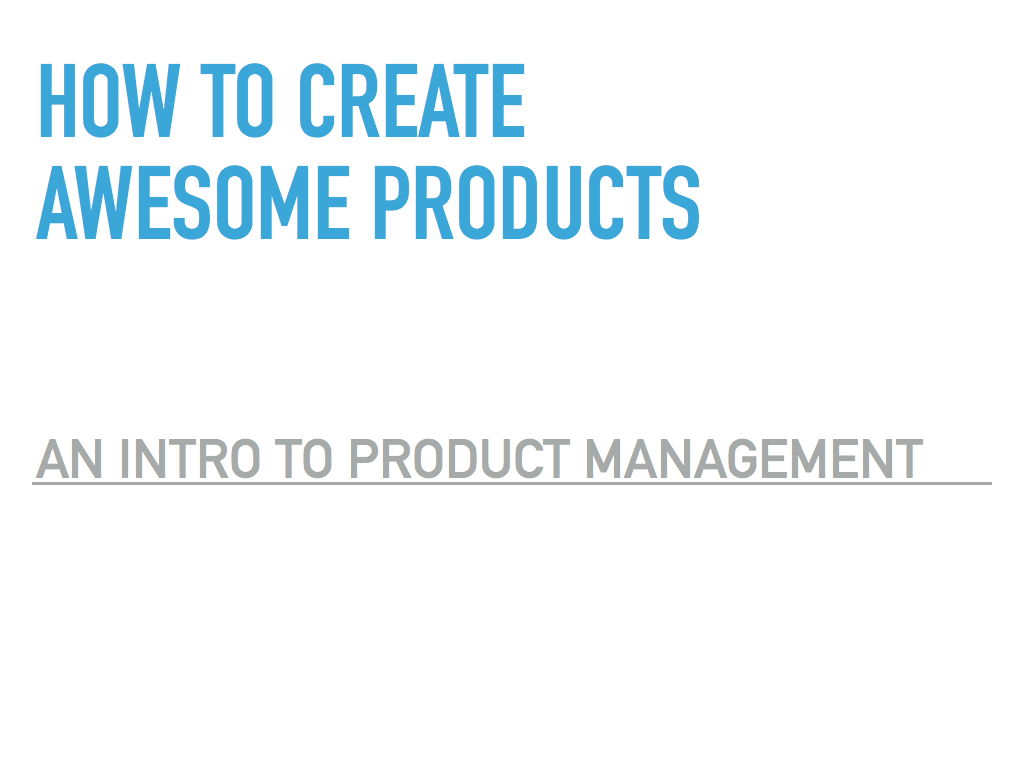
Introduction
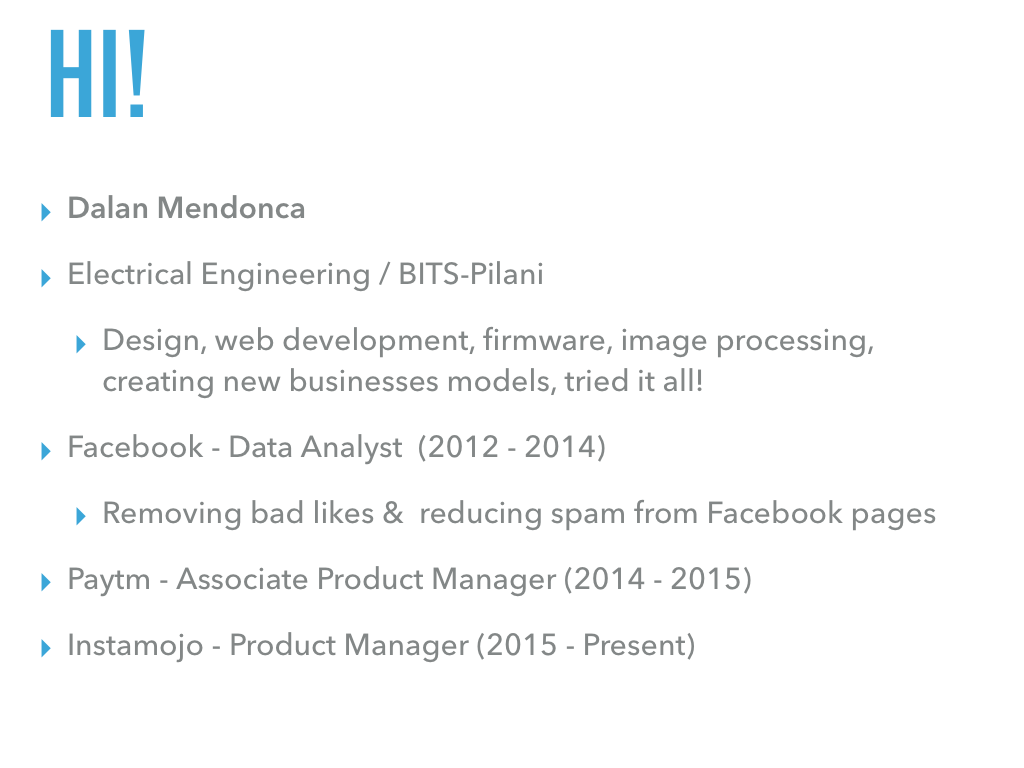 Did electrical engineering in my undergrad from BITS Pilani.
Did electrical engineering in my undergrad from BITS Pilani.
In my undergrad I explored a variety of things. Unlike most people who go engineering college and say “Oh no! Engineering is not for me”, my experience was the exact opposite - went to college and found that I loved coding, firmware, all the things tech
. Learnt firmware, web development, image processing. Apart from that just to balance things out I learnt the basics of design, various business models and tried a variety of things
. This was very all round development where I could myself create a website, create posters, make money out of it. That was a very good foundation for what came ahead.
Removing Bad Likes
My first real job was a data analyst at Facebook. Basic job was doing analysis, catching people who abuse Facebook, do analysis/create models to fight bad behaviour.
Without going into too much details.
Suppose my friend knows my account password and goes and likes a bunch of random pages. Lots of businesses pay to get this done. I was working on writing algorithms that detect when a like is bad and automatically removing it.
Here I learnt a very important lesson, after I was done doing my analysis, writing my algorithm/built my model, I had to go and work with a lot of different people, go and change our policy around likes, worked with out security team - we actually sent legal notices to many people who were making bad software/tricking people into liking pages, go to work with security researches, engineers, designers. Even after I had done my own work - I had to work lawyers, engineers, designers, etc. to make my project successful/ to make it go out and that is a big experience in how it takes more than one person to make a project successful
. It was early intro into what it takes to make a big project happen - and a basic intro into product management.
Post that I was at Paytm as an Associate Product Manager for a short while and things didn’t work there too well. So I went to Instamojo where I am working currently, Instamojo is a startup in the payments and e-commerce. If you want to sell something online, collect payments without doing NEFT - you should come to Instamojo. OK thats a little bit about me, now straight to what we’re here for.
What is a Product Manager?
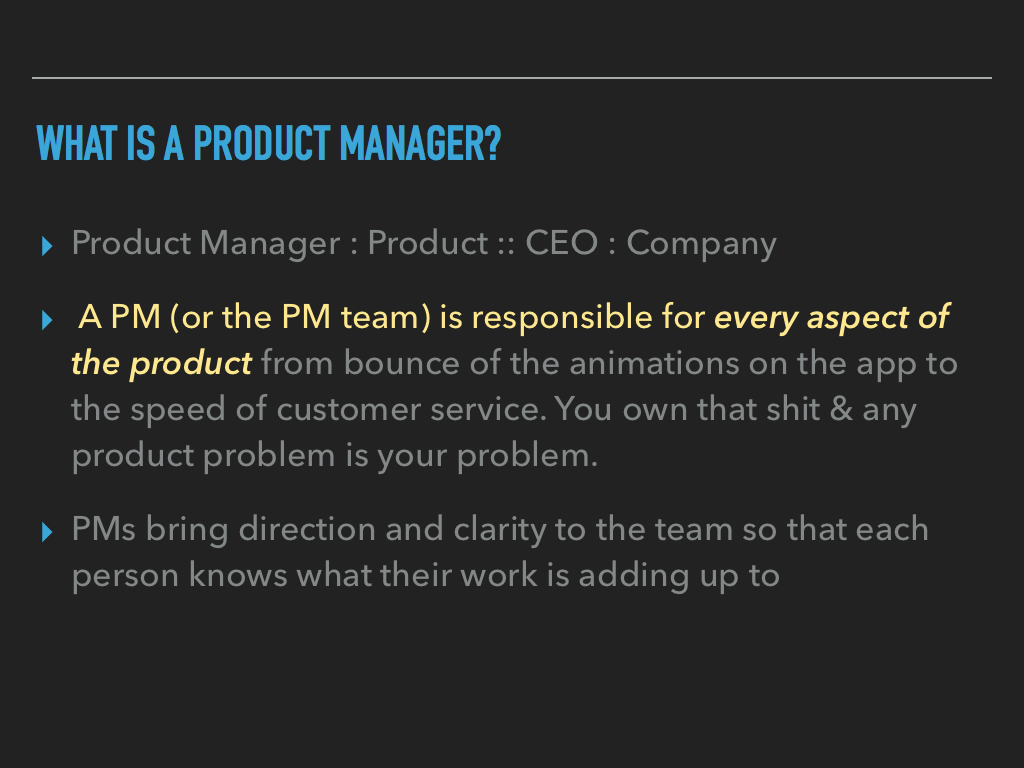 Product Manager : Product :: CEO : Company
Suppose you take a company like Starbucks, the CEO is not making the coffee, not designing the shop, not working on the supply chain but he is responsible for company, he is held accountable when bad coffee is served.
Similarly, a PM or the PM team in a company is responsible for every aspect of the product from bounce of the animations on the app to the speed of customer service. The PM is responsible for everything and owns everything
. But the critical difference is that the product manager does not do all of this work by himself, he ensures that designer has time and tools to create a beautiful looking website, he ensures that people working in support have the best tools - they aren’t overloaded with work and can respond to support requests on time
. This is what is known as “Responsibility without Authority” where I am not the boss of anyone, there’ll be a support team, they’ll have their own managers, there will be an engineering team, they’ll have their own bosses - I’m the person ensuring that everyone is working together towards one direction.
Product Manager : Product :: CEO : Company
Suppose you take a company like Starbucks, the CEO is not making the coffee, not designing the shop, not working on the supply chain but he is responsible for company, he is held accountable when bad coffee is served.
Similarly, a PM or the PM team in a company is responsible for every aspect of the product from bounce of the animations on the app to the speed of customer service. The PM is responsible for everything and owns everything
. But the critical difference is that the product manager does not do all of this work by himself, he ensures that designer has time and tools to create a beautiful looking website, he ensures that people working in support have the best tools - they aren’t overloaded with work and can respond to support requests on time
. This is what is known as “Responsibility without Authority” where I am not the boss of anyone, there’ll be a support team, they’ll have their own managers, there will be an engineering team, they’ll have their own bosses - I’m the person ensuring that everyone is working together towards one direction.
Product Managers bring direction and clarity to the team - everyone should know what they are working on, how it contributes to the product and why it is important.
A story to illustrate this.
Once a senior engineer at NASA was climbing up the building.
She goes up to the first floor and sees a sweeper, she asks him “What are you doing?” He says “I’m just doing my job”, she says “ok”.
She goes up to the second floor and sees a sweeper, she asks him “What are you doing?” He says “I’m making NASA clean so people can work better”, she says “ok”.
She goes up to the third floor and sees a sweeper, she asks him “What are you doing?” He says “I’m putting people into space”, she says “ok”. The third sweeper clearly understood that when he makes NASAs’ floors clean, people can work better and that helps them put people into space.
Everyone person working on your product should have that level of clarity about what we’re doing. They should be work together and having a fun time doing so, and of course you have to ensure they are building the right product and on time.
That is in brief about what is a product manager.
Skills needed to be a Product Manager
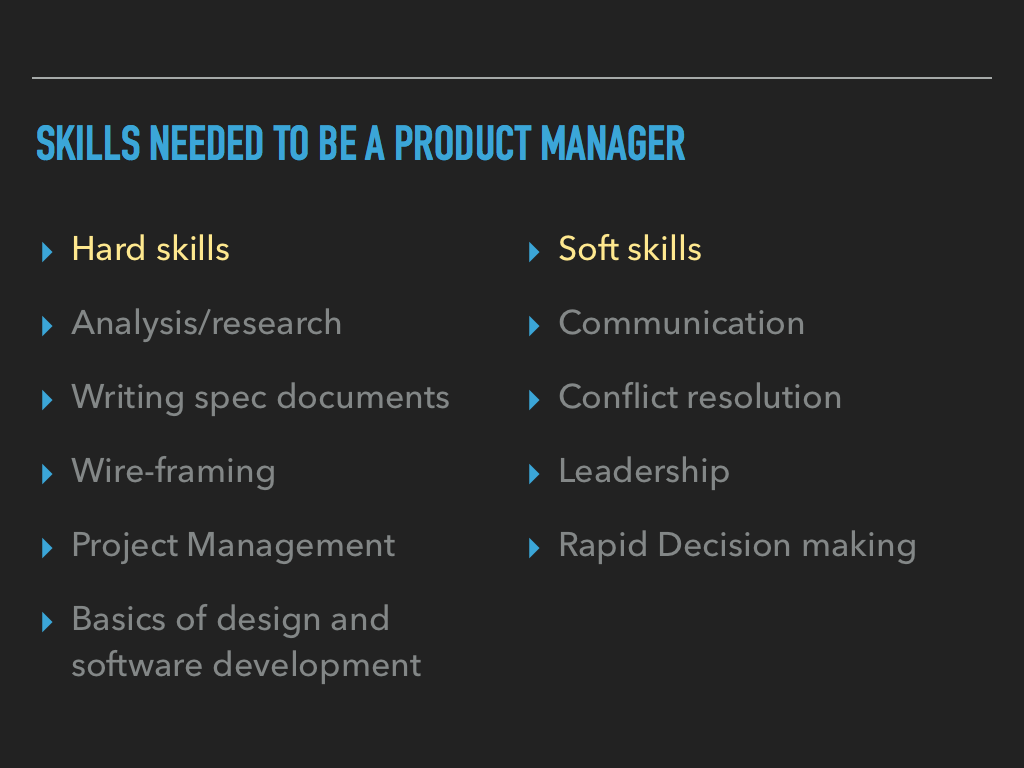 This is one question you would have definitely, what are the skills I need to be a product manager.
Product management is this weird job where your both an individual contributor and a manager.
Hard skills:
Analysis/Research:
This is one question you would have definitely, what are the skills I need to be a product manager.
Product management is this weird job where your both an individual contributor and a manager.
Hard skills:
Analysis/Research:
You cannot just wake in the morning and say we should build this feature. You have to have a proper analysis, you have to do research, you should have very strong reasons why you should build it, you should understand the nature of the competition, how much money you have, how much can you spend on marketing, how much can you spend on building it, how many engineers would it take you to build this? All of these questions need solid answers
. You can’t just get up in the morning and say I want to build something, you have to calculate the ROI, if we build something, how much will we earn? how big can it be? how big is the market? All these questions need to answered before anyone starts working on anything, before an engineer puts something to code.
Writing spec documents:
Spec documents are one of the crucial outputs of product managers, they describe in detail what the product will do. Say I’m building a feature, how fast it’s gonna launch, how much time do we expect it to take, who’s going to work on it, how difficult is it going to be, what engineering components do we have to change; all of it is mentioned in the spec document.
Wire-framing:
Its not very easy to convince people with words, it much easier to convince with pictures. Suppose I describe Instagram as app where there are images and you can give comments and you can like things - its very boring
. But if I show you a prototype or show you a mockup - where you see your photo, your friends, etc. It’ll instantly click, you’ll understand “Ok this is what we wanna do”
. SO wire-framing or making visuals of your ideas is a very important skill.
Project Management:
After you’ve done the research, after you’ve picked the right thing, after everyone is convinced about they want to build - its very important that things get done on time, that things get done well. You take a big project and break it into small milestones - this is essentially project management and this is a critical skill every product manager needs to have.
Basics of design and software development:
You cannot be a product manager in the software business without knowing the basics of design and without knowing the basics of software development.
Why? Today if you’re building an ecommerce website it cannot be worse that Flipkart. Facebook has set the standard about what social network should look like
. There are certain things expected - you have to understand what makes these websites successful and ensure that the basic elements are present in your website, otherwise users or customers will just go away
. They’ll say this website is weird, doesn’t fulfil my need and they will give it up. Another thing is turn your dreams into a reality, you need to work of course with software engineers
. And you cannot work with them if you don’t understand what they do, what is agile, what is git, what is version control, how do we deploy code, its definitely good to know the basics of software development.
Moving on to Soft skills:
These are equally important if not more important that your hard skills. These are critical to your success, because you serve as both the person deciding what to build and ensuring things get built
. Without a doubt, while you’re on your journey of building things, there’s going to be confusion, people are going to build the wrong things, people are going to veer off in different directions.
So the first important soft skill is
Communication:
Keeping everyone on the same page.
Keeping everyone motivated. Ensuring that everyone has the same understanding of what you’re going to be build - that is a mission critical skill to have.
Conflict resolution:
Every few days I’ll encounter a situation where the designer want to do this but engineer doesn’t want to do that, the CEO wants to do something else. Everyone is building their own dream
. It is your job to ensure that the conflict is resolved, that you find a great decision and that you move forward. The bus doesn’t get stuck because you cannot decide.
Rapid Decision Making:
Related to conflict resolution.
Sometimes you don’t have enough time to do all the research in the world, find out everything, ask people, etc. Sometimes you just have to do decisions by gut
. So you need to be able to think on your feet really fast or use your intuition properly to make decisions very quickly.
And of course a natural skill every PM needs to have is that he has to lead the product team - he has to lead the team of engineers, the design team or the support staff. He ha to be a leader of all of these guys . So leadership is also a critical skill here.
Steve Elon Me
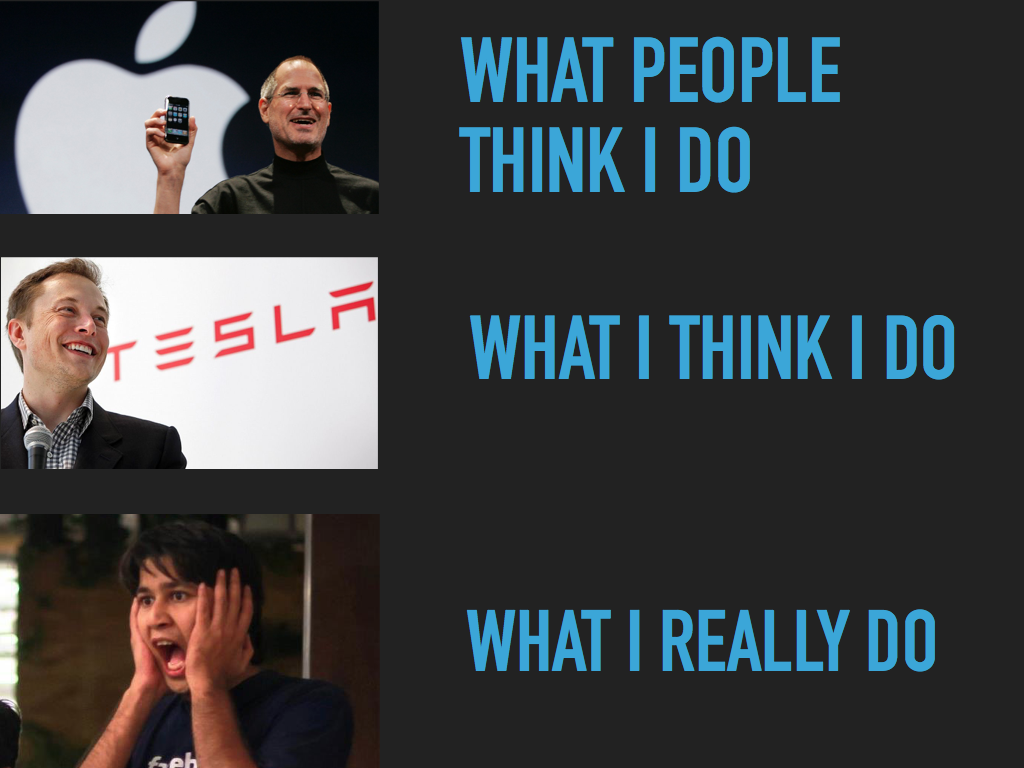 Story of my life.
Story of my life.
What does a product manager do?
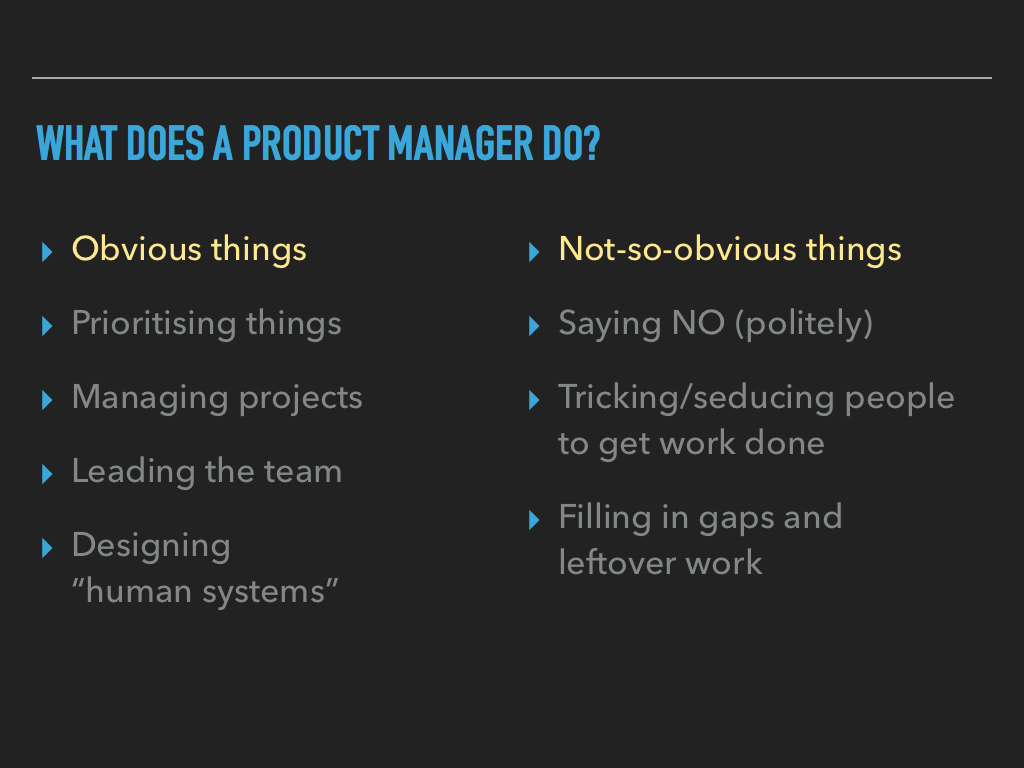 On day to day basis, you’ll be wondering what do I actually do.
Obvious things
On day to day basis, you’ll be wondering what do I actually do.
Obvious things
Prioritising things:
You have an existing product and people are going to come to you with say 50 requests. Any product, be it Whatsapp, Whatsapp can put a wallet into Whatsapp, Whatsapp can do video calls, Whatsapp can do disappearing photos like Snapchat, there are hundreds of things Whatsapp can do
. Somethings are important, somethings are not important, who proritizes this? This is the job of the product manager - this is an obvious input that your bring to the team and the company where you decide that - this is critical/this is not critical and this is to be done/this is not to be done.
Managing projects:
Once you’ve decided what is to be done .. DO IT!
Since you won’t be doing it alone, you have to ensure that engineers build things on time, that if we promise 15 days for it, it has to be done in 15 days. We do it right, the quality is correct, that we don’t release something bad and spoil the reputation of the company.
Leading the team:
You have to keep your people motivated. Keep giving them the right direction, keep showing them the bigger picture.
Designing human systems:
Every great company or every great team, they have their own style of doing things. Manchester United is a football team, they have their own style of play, they do a lot of long passes
. A different team like Arsenal will hold the ball for a long time. Teams have their own style of playing and their own style of doing their work. You have to ensure your team develops own style, they have fun doing things together
. So that is what I call designing a human system.
Not so obvious things
Saying NO:
A very important job here is saying NO.
If you’re the product manager at Whatsapp, people are going to come and say to you - why don’t you do video calling, why don’t you do stickers, why don’t you do something like Snapchat, why don’t you do a feed like Facebook. It’s important to say no because when you say yes to everything you become a useless product - its very very important to just pick a few things and get them right rather than trying to do hundreds of things and becoming good at nothing.
Whatsapp is a very good example - they don’t do too many things, they are very good at messaging - their messages go on time, they are very reliable, very efficient; wonderful. They’ve said no to hundreds of things, and the few features they’ve picked they’re doing it excellently.
Tricking/seducing people to get work done:
So predicting software projects is both an art and a science and mostly an art. No one gets it right, sometimes for a deadline, when you’re going to miss it you gotta convince your engineers, literally sometimes beg of them, “Hey please, can we get it done, this is important”
. Convincing people to work a bit harder tricking them/seducing them, doing whatever it takes is a basic skill. “Do whatever it takes to get shit done”, that is the broad idea here.
Filling in gaps and leftover work:
In my company, we provide Payments APIs. People can integrate our API in their website and start collecting payments. Just so happens that our engineer built the API but forgot to document it and his english also was not that great.
So it was upto me to sit and understand what every API does, what every endpoint does, find out what are the parameters, make some nice beautiful documentation which the customers can understand and finally put it on the website.
Did I know how to write documentation? NO
Did I write the documentation? YES!
Can I do such things in the future? YES!
This is the art of doing whatever it takes, there are a lot of gaps, lot of leftover work and you have to do it to make your product successful. Because how can API be successful without great documentation but unfortunately we didn’t have an engineer who could write great documentation but I did it
. This is something you have to learn.
Whom is Product Management for?
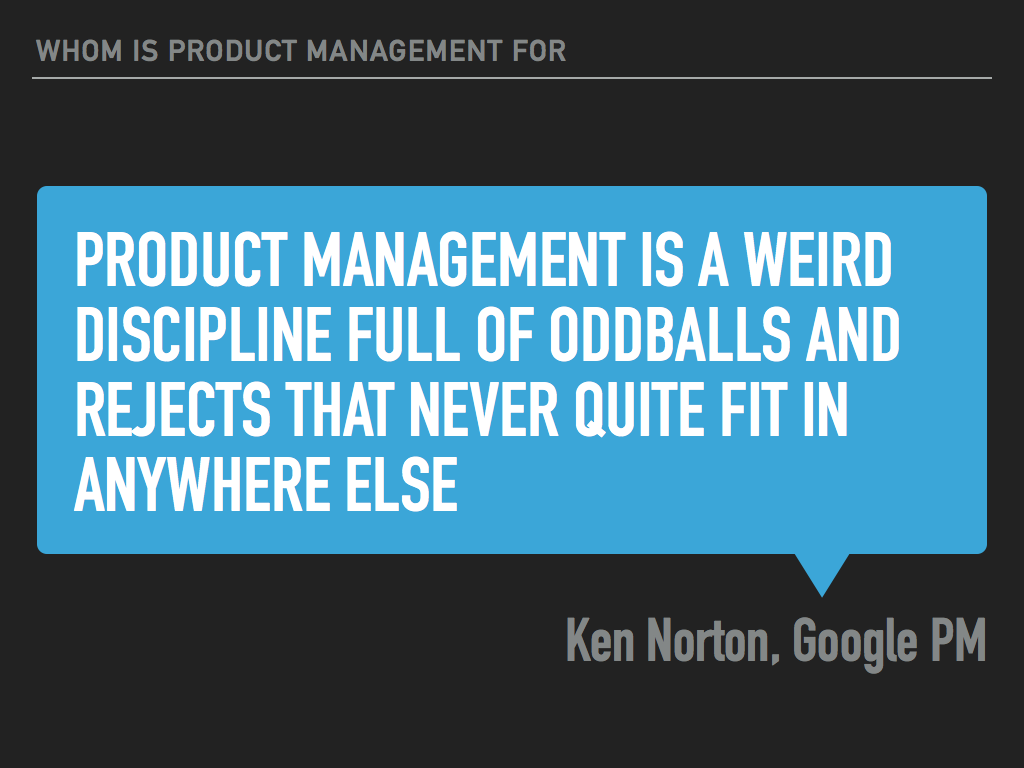 Product Management is a generalist profession.
Product Management is a generalist profession.
You’re not going deep into anything.
You’re not going deep into engineering,
You’re not going deep into sales,
You’re not going deep into marketing,
You’re not going deep into design,
You’re a generalist who’s in the middle of all of this.
Say you are engineer and you learn coding and you fall in love with it, then probably product management is not for you. But if you like engineering a bit and a bit of design also, then product management is perfect.
In my college days I did a lot of software projects, did a bit of design, learnt photoshop, etc. but I never felt like I wanted to go deep into any of those things. but today I feel wonderful because all those skills come together and I can create great products.
As Ken Norton, a very famous product manager from Google says:
Product management is a weird discipline full of oddballs and
rejects that never quite fit in anywhere else
Because if you fit into marketing or sales or engineering, you already found what you’re good at; if not you should probably try product management.
Far & Together -> Product Management
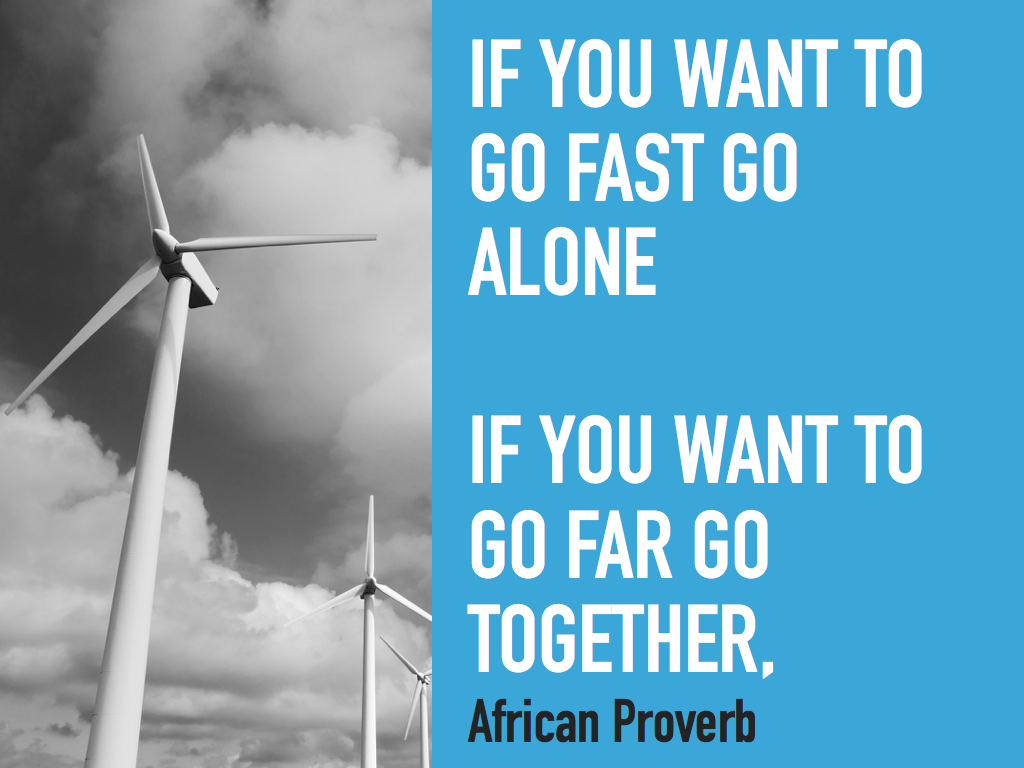 Again I emphasise working with a team vs working alone.
If I want to go fast i.e. if I wanted to build something quickly, I’d code up something, setup a server and get started. But if I wanted to build something big - a product that affects lots of lives, that is complicated to build, I have to build a team around it.
If you want to go far and together, you have to be a product manager.
Again I emphasise working with a team vs working alone.
If I want to go fast i.e. if I wanted to build something quickly, I’d code up something, setup a server and get started. But if I wanted to build something big - a product that affects lots of lives, that is complicated to build, I have to build a team around it.
If you want to go far and together, you have to be a product manager.
If you want to go fast and alone, you can be any of the individual contributors.
That is another reason why I chose to be a PM, I wanted to focus on the bigger picture of building a great product rather than getting caught in any of the intermediate aspects.
Career Prospects
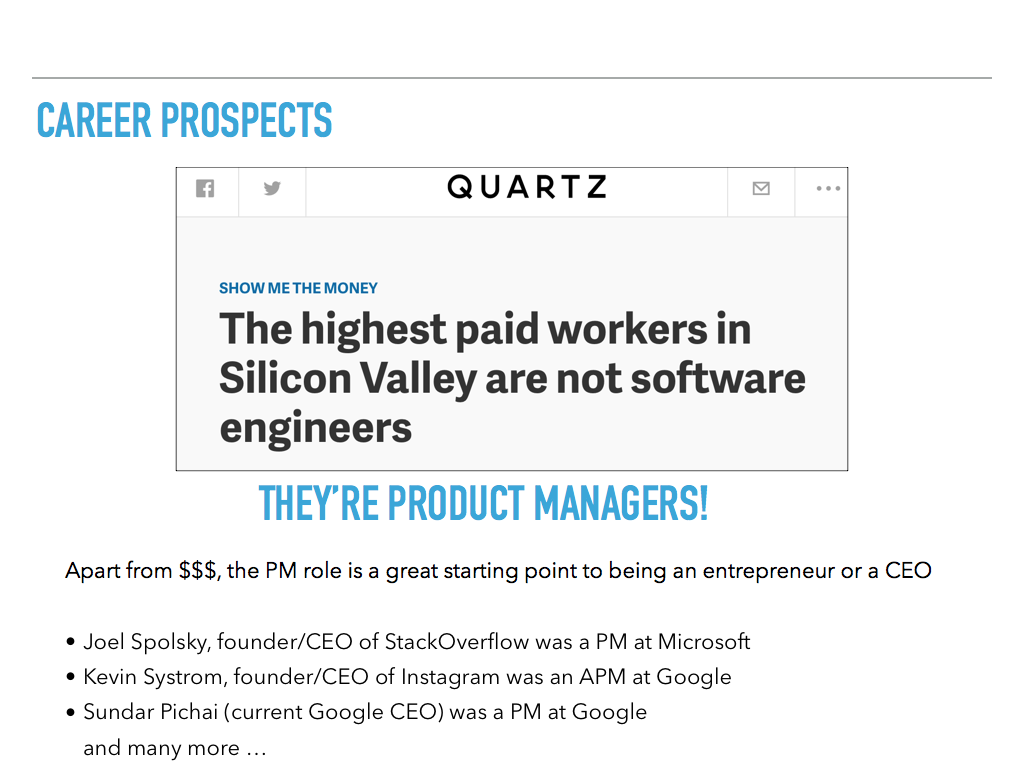 Career prospects are fabulous.
Career prospects are fabulous.
PMs are some of the highest paid people in tech companies, on the flip side there are very few product management roles.
A typical team will have 7-10 engineers, 2 designers and 1 Product manager; you can keep extending this rough ratio.
You get paid more, you have more responsibility but there’s more competition.
Apart from the sheer monetary aspects of it, the PM role is a wonderful training ground if you ever want to be an entrepreneur or a CEO or lead a team.
- Joel Spolsky, founder/CEO of StackOverflow was a PM at Microsoft
- Kevin Systrom, founder/CEO of Instagram was an APM at Google
- Sundar Pichai (current Google CEO) was a PM at Google
and there are many more examples like these. Because the job and the role is kind of identical - leading a team, responsibility without authority, motivating people; the overlap between being a CEO or a founder and being a Product manager is extremely high.
If you become good at product management, it’s easy to transition to a CEO role or an entrepreneurial role in the future.
As obvious, I love the job, it’s well paying and has great prospects too.
Questions?
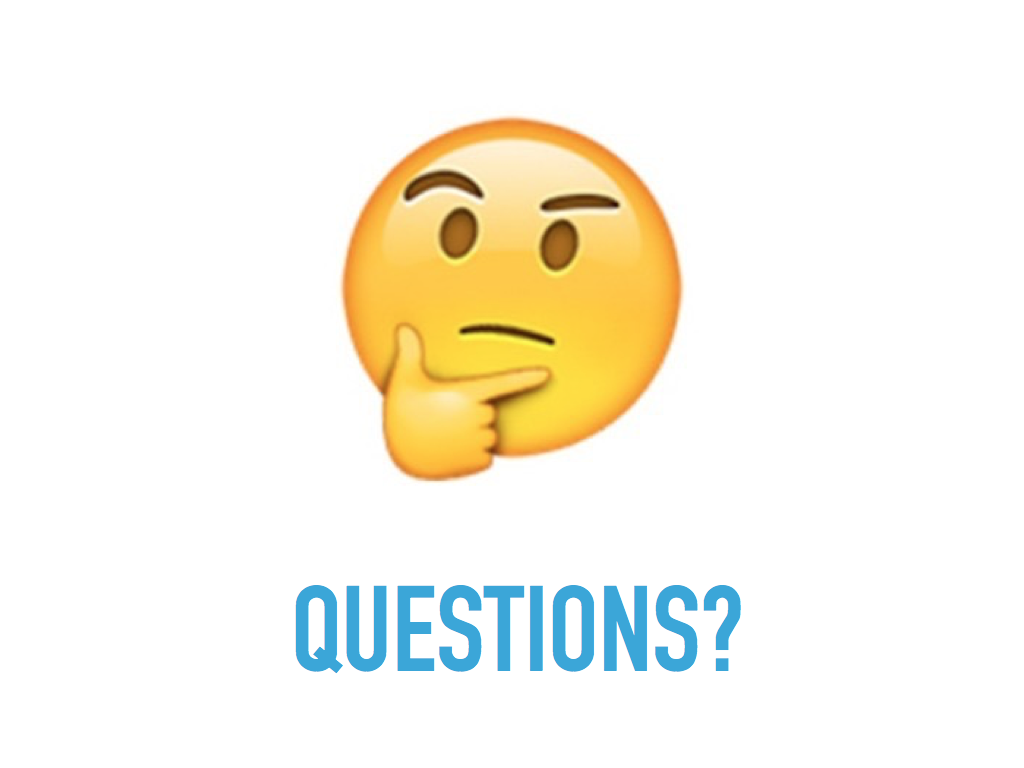 What are the basic qualifications required to be a product manager?
What are the basic qualifications required to be a product manager?
//Forgot to mention “Skills needed” slide :D
To tell you the truth, there are no qualifications required.
You should’ve taken a project from start to finish - whatever project be it, whether you’re trying to solve the quality of support or trying to improve spam models - you should’ve taken a project from start to end - started it, finished it, launched it, it has completed it’s entire lifecycle.
The other qualification you need to have is that you should have worked with a diverse set of stakeholders. It’s easy to work with just 2-3 kinds of people and feel you’re doing good - but in the real life you have to deal with a lawyer, an accountant, a marketer.
That’s kind of a circular explanation but easiest route is to work on a side project with a few people.
People say that an MBA is necessary to be a product manager or that you need to have a CS background to become a product manager, that is complete rubbish. I don’t have an MBA, many product managers who don’t come from CS backgrounds; that is a complete myth.
What are the pro/cons of working at a startup as a product manager vs working at a large company?
Fantastic question.
[Redacted]

